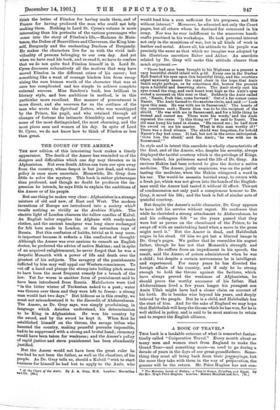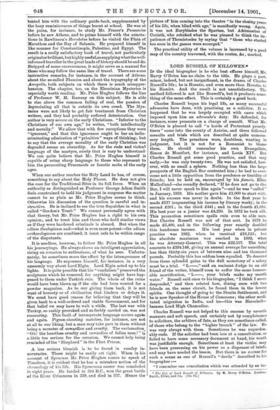A BOOK OF TRAVEL.* Tars book is a laudable outcome
of what is somewhat fantas- tically called "Cooperative TraveL" Every month about as many men and women start from England to make the Grand Tour—and something more—as used to go during a decade of years in the days of our great-grandfathers. Some- thing they must all bring back from their journeyings, but the more they take with them in the way of preparation, the greater will be the return. Mr. Price Hughes has not con-
• The Horning Lands of History : a Viatt to Greece. Palestine, and Egypt. By the Bev. Hugh Price Hughes. London: Horace Marshall and Son. [ee.]
*tented him with the ordinary guide-book, supplemented by the hazy reminiscences of things learnt at school. He was at
• the pains, for instance, to study Mr. Frazer's Pausanias 'before he saw Athens, and to prime himself with the annota- tions in Raavlinson's Herodotua before he visited the Plain of Marathon and the Bay of Salamis. He prepared himself in like manner for Constantinople, Palestine, and Egypt. The result is a really satisfactory book of travel, not particularly original or brilliant, but highly usefuLas supplying what the well- informed traveller in the great lands of history should be and do. Stripped of some excrescences, it might serve as a manual for 1 those who may follow the same line of traveL There are some instructive remarks, for instance, in the account of Athens, about the so-called Theseion and about the topography of the Acropolis, both subjects on which there is much misappre- hension. The chapter, too, on the Eleusinian Mysteries is especially worth reading. Mr. Price Hughes follows the line of Professor W. M. Ramsay on this subject. He is able to rise above the common failing of zeal, the passion of depreciating all that is outside its own creed. The Mys- teries were not likely to get fair treatment from Christian writers, and they had probably suffered deterioration. Our author is very severe on the early Christians. "Inferior to the Christians of our own age," be writes, "both intellectually and morally." We allow that with few exceptions they were "ignorant," and that this ignorance ought to bar an indis- criminating admiration of " primitive " ways of thinking; but to say that the average morality of the early Christian was degraded seems an absurdity. As for the rude and violent language of the martyrs, surely that is easy to understand. We can quite believe that Mr. Price Hughes himself is capable of using sharp language to those who represent to him the persecuting Proconsuls or fanatic mobs of the early ages.
When our author reaches the Holy Land he has, of course, something to say about the Holy Places. He does not give the case for the Traditional Sites in its full force. When an authority so distinguished as Professor George Adam Smith feels constrained to hold his judgment in suspense the matter cannot be as plain as Mr. Price Hughes seems to think. Otherwise his discussion of the question is careful and in- structive. He is inclined to see the true Sepulchre in what is called "Gordon's Tomb." We cannot -personally agree with that theory, but Mr. Price Hughes has a right to his own opinion; and to treat him and those who hold similar views as if they were hardened criminals is absurd. But when the odium theologicum and—what is even more potent—the odium archaeologicum are combined, it isnot safe to be within range of the disputants.
It is needless, however, to follow Mr. Price Hughes in all his journeyings. He always shows an intelligent appreciation, rising on occasion to enthusiasm, of what he sees. Unfortu- nately, he sometimes mars the effect by the intemperance of his language. He expresses himself, for instance, in a very unseemly way about Lord Elgin. Lord Elgin acted up to his lights. It is quite possible that his "vandalism" preserved the sculptures which he removed, for anything might have hap- pened to them under Turkish rule. The whole of the ruins would have been blown up if the site had been wanted for a powder magazine. As to our giving them back, it is not want of honesty or of civilisation that hinders or delays it. We must have good reason fur believing that they will be given back to a well-ordered and stable Government, and for that belief we may have to wait a while. The last war with Turkey, so rashly provoked and so feebly carried on, was not reassuring. This fault a intemperate language occurs again and again. Pigeon-shooting matches, for instance, are not at all to our liking, but a man may take part in them without being a monster of cowardice and cruelty. The exclamation, "Oh! the heartless cruelty and cowardice of fallen man ! " is a little too serious for the occasion. We cannot help being reminded of the Shepherd" in the Fleet Prison.
A less serious blemish is to be found in sundry in- accuracies. These might be easily set right. When in his account of Syracuse Mr. Price Hughes comes to speak of Timoleon, it is evident that he has a mistaken notion of the chronology of his life. His Syracusan career was concluded in eight years. He landed in 344 B.C., won the great battle of the River Crimessus in 339, and died in 337. Hence the
picture of"him coming into the theatre "in the closing years of his life, when blind with age," is manifestly wrong. Again, it was not Etnybiadea the Spartan, but Adeimantus of Corinth, who rebuked what be was pleased to think the im- patience of Themistocle,s by saying that "those who started too soon in the games were scourged."
The practical utility of the volume is increased by a goad map of the country traversed, with the routes, &c, marked.















































 Previous page
Previous page